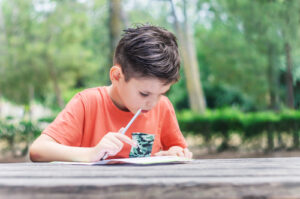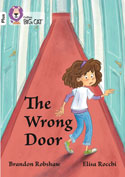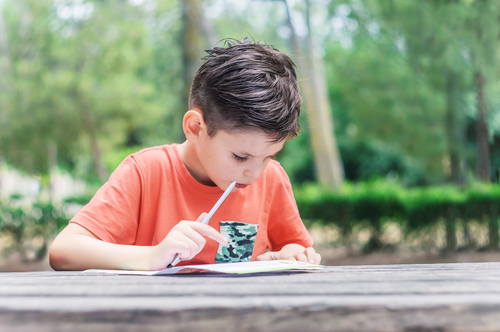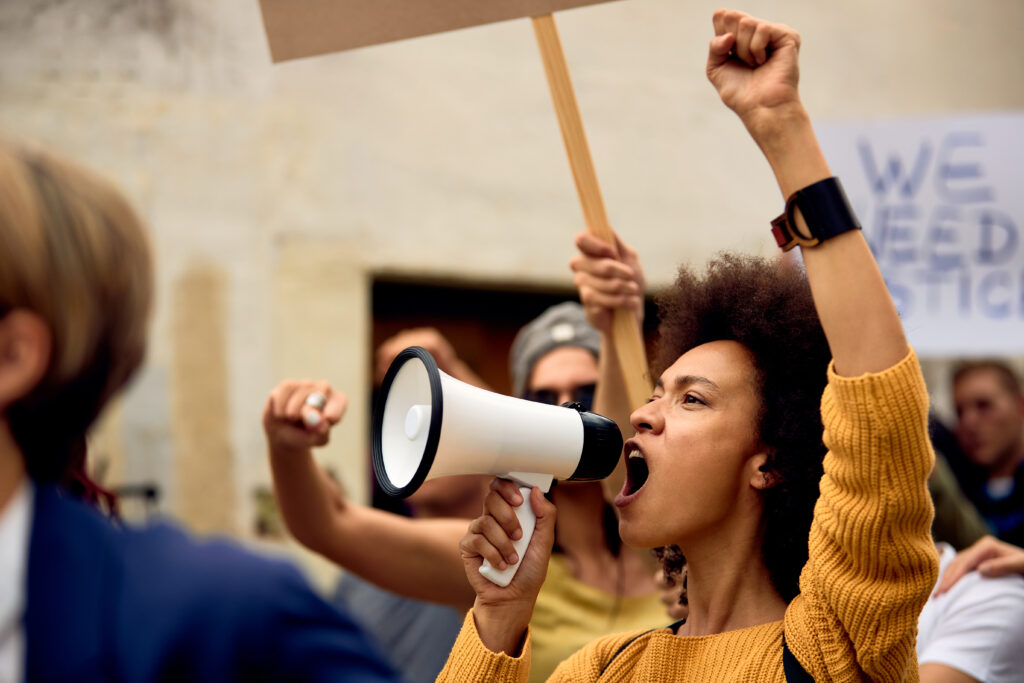Collins Big Cat author Brandon Robshaw shares his own experiences of writing, plus tips on how to get children excited about writing fiction.
Human beings are natural storytellers. Almost as soon as we can talk we find ourselves telling stories – little accounts or reports of things that have happened to us. We tell our parents why we’re crying or what our little sister did or what we saw on television or what games we’ve been playing or what we did in school that day. And we don’t just give dry factual reports: we share memories, thoughts, attitudes and feelings. Quite often we tell made-up stories, jokes, fantasies, tall tales, stories about imaginary friends. This isn’t something we need to be taught to do. Stories just bubble out of us, easily and naturally. (We don’t even stop making up stories when we’re asleep, for what are dreams but the stories our brain creates when it’s off the leash?)
What’s more, the stories we tell each other in conversation often use techniques to make things more interesting, even though we may not be consciously aware of it. We don’t bother with boring, irrelevant details, but try to focus on the most interesting parts. We wouldn’t describe the weather – unless the point of the story is about getting soaked, or sunburnt. Sometimes we describe what people looked like, or sounded like. We report things they said and exaggerate to make it more entertaining. And we don’t give away the ending. We save it up until it will have maximum impact. We use phrases to build up the suspense: ‘And you’ll never guess what happened next!’ ‘Who do you think was standing there when I went through the door?’ ‘And then something really weird happened…’
 And yet. Although we are natural, practised storytellers, it can seem much more difficult when we have to get a story down on paper. Then we start to worry about whether we are telling it right. (We might also worry if we have spelt words correctly or punctuated accurately.) The key to good writing, I think, is to tell your story in the easiest, most natural way, as if you’re speaking to a friend. That’s the way to get your first draft down. Afterwards, of course, you can redraft it. Improve the word choice. Cut out the boring bits. Go to town on the interesting bits. (And, of course, tidy up the grammar and spelling.) Redrafting is part of the craft of writing and it can be the most enjoyable bit, as you polish your story until it shines.
And yet. Although we are natural, practised storytellers, it can seem much more difficult when we have to get a story down on paper. Then we start to worry about whether we are telling it right. (We might also worry if we have spelt words correctly or punctuated accurately.) The key to good writing, I think, is to tell your story in the easiest, most natural way, as if you’re speaking to a friend. That’s the way to get your first draft down. Afterwards, of course, you can redraft it. Improve the word choice. Cut out the boring bits. Go to town on the interesting bits. (And, of course, tidy up the grammar and spelling.) Redrafting is part of the craft of writing and it can be the most enjoyable bit, as you polish your story until it shines.
But what story are you going to tell? Faced with a white page you can feel paralysed by indecision. Your mind goes as blank as the page. That is when you need some kind of prompt, to focus on something specific. And then a story will start to grow in your mind…
 For The Wrong Door, I decided to draw on my own childhood. Although, unlike Molly, I never had to go to a holiday club, I did often feel shy when meeting large groups of new people and wanted to get away. So I used that as my starting point. And then I thought, what if Molly escapes and wanders off on her own? Here I had to make a decision about whether this would be a scary story or a funny story. It could easily have been a scary story, if she had met a dangerous character, a wicked witch or an escaped tiger. But as a child I was particularly fond of funny stories, and stories about mistaken identity always made me laugh. So I thought, ‘What if Molly keeps getting mistaken for somebody else?’ – and the story just built from there. (It had to go through quite a few drafts, though!)
For The Wrong Door, I decided to draw on my own childhood. Although, unlike Molly, I never had to go to a holiday club, I did often feel shy when meeting large groups of new people and wanted to get away. So I used that as my starting point. And then I thought, what if Molly escapes and wanders off on her own? Here I had to make a decision about whether this would be a scary story or a funny story. It could easily have been a scary story, if she had met a dangerous character, a wicked witch or an escaped tiger. But as a child I was particularly fond of funny stories, and stories about mistaken identity always made me laugh. So I thought, ‘What if Molly keeps getting mistaken for somebody else?’ – and the story just built from there. (It had to go through quite a few drafts, though!)
Here, then, are a few prompts to get you thinking:
- Write a story about something that scares you (e.g. if you are scared of spiders, write about spiders)
- Write a story about something that makes you laugh (e.g. if you think grown-ups acting childishly is funny, write about a teacher who acts like a child)
- Write a story about a polar bear on a melting ice-cap
- A story about life in the year 2050
- A story about some kids who clean up a polluted river
- A story about someone who finds a mermaid while cleaning up a polluted river
- An autobiographical story about your first day at school
- A school story about someone who cheats in an exam
- A science-fiction story about a family of aliens who visit Earth for a holiday
- A day in the life of a family in a war-zone

This blog post is written by Brandon Robshaw, author of Collins Big Cat book, The Wrong Door.
Brandon was also a judge of the 2019 Collins Big Cat writing competition. The theme was ‘Our World, Our Home: Be a Big Cat Eco-warrior’ in response to the growing importance of the environment on our daily lives. You can view Brandon reading one of the winning entries here.



